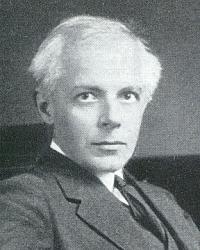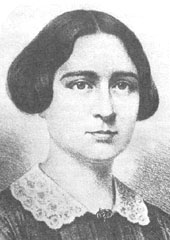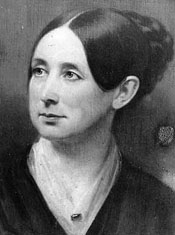Abbot, Francis Ellingwood
Francis Ellingwood Abbot (November 6, 1836-October 23, 1903), a founder of the Free Religious Association and first editor of the radical journal, the Index, developed
Francis Ellingwood Abbot (November 6, 1836-October 23, 1903), a founder of the Free Religious Association and first editor of the radical journal, the Index, developed
William Adam (November 1, 1796-February 19, 1881), born in Dunfermline, Fife, Scotland, began his ministry as a Baptist missionary in India. His labors in India
The journalist, historian, novelist, Henry Brooks Adams ( February 16, 1838-March 27, 1918) was the son of Civil War diplomat Charles Francis Adams and Abigail
Charles Francis Adams Jr. (May 27, 1835-May 20, 1915) was a lawyer, writer, railroad regulator, arbitrator, journalist, railroad president, and soldier. Reared a Unitarian, his
Charles Francis Adams, Sr. (August 18, 1807-November 21, 1886), a lifelong Unitarian, was an antislavery politician who later opposed radical reconstruction of the South. As
Hannah Adams (Oct. 2, 1755-Dec. 15, 1831) born in Medfield MA, she was the first American, man or woman, known to attempt to support herself
Hannah Adams (October 2, 1755-December 15, 1831), an early American historian and pioneer in the field of comparative religion, was also the first American author
James Luther Adams (November 12, 1901-July 26, 1994) was a Unitarian parish minister, social activist, journal editor, distinguished scholar, translator and editor of major German
John Adams (October 30, 1735-July 4, 1826), first vice-president and second president of the United States, was a leader of the American Revolution, diplomat, and
John Quincy Adams (July 11, 1767-February 23, 1848) spent most of his youth and adult life in public service to the United States, as senator,
Peter Charadon Brooks Adams (June 24, 1848-February 14,1927) was a lawyer, historian, and writer, who served as an informal adviser to President Theodore Roosevelt. Although
Elizabeth Cabot Cary Agassiz (December 5, 1822-June 27, 1907) was an early advocate for the education of women. However, she was conservative about women’s rights.
Amos Bronson Alcott (November 29, 1799-March 4, 1888), educator, philosopher, utopian, and visionary, ran the progressive Temple School in Boston, founded the Fruitlands community in
Louisa May Alcott (November 29, 1832-March 6, 1888), best known as the author of Little Women, was an advocate of abolition, women’s rights, and temperance. Her
Horatio Alger, Jr. (January 13, 1832-July 18, 1899), briefly a Unitarian minister, was a popular nineteenth-century author of juvenile fiction. His “rags to riches” stories
Nathan Appleton (October 6, 1779-July 14, 1861) was a merchant, manufacturer, financier, politician and philanthropist, best known as a pioneer in establishing textile manufacturing in
Thomas Gold Appleton (March 31, 1812-April 17, 1884) wrote that in his day, “forms of luxury and self-indulgence displace the severe austerities of our fathers;
Robert Aspland (January 13, 1782-December 30, 1845), father of organised Unitarianism in Great Britain, was the most widely known Unitarian minister of his day. He
Robert Brook Aspland (January 19, 1805-June 21, 1869), son of Robert Aspland, succeeded his father’s as editor of the Christian Reformer and as secretary of the British
Johannes Abraham Christoffel Fagginger Auer (August 6, 1882-March 3, 1964) was a Unitarian minister, author, professor of Church History and of the Philosophy of Religion
Edwin Burdette Backus (December 27, 1888-July 7, 1955), a Unitarian minister and proponent of humanism, had a popular radio ministry. He was a notable supporter
William Sullivan Barnes (June 16, 1841-April 2, 1912), an outstanding preacher, was for thirty years minister of the Church of the Messiah (Unitarian) in Montreal.
Samuel Barrett (August 16, 1795-June 24, 1866) was an active and much respected Unitarian minister in the early days of the organized American Unitarian movement.

Béla Bartók (March 25, 1881-September 26, 1945), the greatest Hungarian composer, was one of the most significant musicians of the twentieth century. He shared with
Seth Curtis Beach (August 8, 1837-January 30, 1932) was a Unitarian minister, author, poet and hymnist. He was born in western New York State to
John Relly Beard (August 4, 1800-November 22, 1876), British educational reformer and minister, was a militant exponent and populariser of mid-Victorian Unitarianism. His most enduring
Henry Whitney Bellows (June 11, 1814-January 30, 1882) was minister of the First Congregational Church of New York City (now the Unitarian Church of All
William Bentley (June 22, 1759 -December 29, 1819), the minister of the East Church in Salem, Massachusetts, was one of the first New England ministers
Henry Bergh (August 29, 1811-March 12, 1888) was the founder of the American Society for the Prevention of Cruelty to Animals (ASPCA) and was instrumental
Leon Milton Birkhead (April 28, 1885-December 1, 1954), a controversial Methodist and Unitarian minister, achieved national prominence in the 1940s as director of the Friends

Antoinette Louisa Brown Blackwell (May 20, 1825-November 5, 1921), a women’s rights activist and social reformer, was the first American woman to be ordained as
Elizabeth Blackwell (February 23, 1821-May 31, 1910) was the first woman to earn a degree from medical school in the United States and the first
Harriot Stanton Blatch (January 20, 1856-November 20, 1940) was a leader in the woman suffrage movement, a writer and an advocate for labor reform. She
Sir Adrian Cedric Boult (April 8, 1889-February 22, 1983) was one of the foremost British conductors of his time. Well-known for his advocacy and performance
Nathaniel Bowditch (March 26, 1773-16 March 16, 1838), a self-taught astronomer, navigator, and business executive, was one of America’s first scientists. His enduring reputation is
Sir John Bowring (October 17, 1792-November 23, 1872), a man of amazing energy and a polymath, was a linguist, political economist, reformer, hymnist, writer and
George Bradburn (March 4, 1806-July 26, 1880), antislavery politician, was a journalist, lecturer, and Unitarian minister. He was a friend and co-worker in the abolitionist
Franklin Bradley (February 2, 1831 – May 3, 1909) was a Non-Subscribing Presbyterian minister in Northern Ireland and England and the first minister to Unitarians
Raymond Bennett Bragg (October 10, 1902-February 15, 1979), a Unitarian minister and civic leader, played a key role in the making of the Humanist Manifesto
Brook Farm, a celebrated nineteenth-century New England utopian community, was founded by Unitarian minister George Ripley and other progressive, Transcendentalist Unitarians, to be, in Ripley’s
Florence Buck (July 19, 1860-October 12, 1925) was a Unitarian minister at a time when women ministers were uncommon and a leader in the development
Celia Burleigh (September 18, 1826-July 25, 1875) was ordained at Brooklyn, Connecticut, on October 5, 1871, the first woman to enter Unitarian ministry. Had this
Harold Hitz Burton (June 22, 1888-October 28, 1964) was a Unitarian layman, lawyer, and politician who served as Moderator of the American Unitarian Association (AUA).
John Caldwell Calhoun (March 18, 1782-March 31, 1850) was a United States representative, senator, secretary of war, secretary of state, and vice president. A political
Lon Ray Call (October 6, 1894-October 7, 1985) was a Unitarian minister and denomination official best known for his evangelism. Instrumental in the development of
Angus de Mille Cameron (June 9, 1913-November 23, 1996) was one of a small group of Canadian ministers whose introduction into Canada in the 1940s
Ida Maud Cannon (June 29, 1877-July 8, 1960) was a pioneer in the hospital social service movement which began in Boston in the first decade
If your browser can read Czech characters, click here. Norbert Fabian Capek (June 3, 1870-October 12, 1942), a Czechoslovak minister of extraordinary ability, after spending
If your browser cannot read Czech characters, click here. Norbert Fabián Čapek (1870-1942), a Czechoslovak minister of extraordinary ability, after spending a few years in
Paul Nathaniel Carnes (February 1, 1921-March 17, 1979), a longtime minister at the Unitarian Universalist Church of Buffalo, New York and a proponent of desegregation
Samuel Carter (May 15, 1805-January 31, 1878) was a lawyer who shaped the legal codification and business practices of the early railways in England. For
Sir John Carter (before December 20, 1741-May 18, 1808), a Unitarian merchant, was on nine occasions Mayor of Portsmouth, the chief maritime port for the
Ernest Cassara (June 5, 1925-April 10, 2015) was a Unitarian and a Universalist minister, a scholar of American Universalism, and a professor of history. He
Sir (Joseph) Austen Chamberlain (October 16, 1863-March 16, 1937), British politician and statesman, was the son of Joseph Chamberlain and the older brother of Neville
Joseph Chamberlain (July 8, 1836-July 2, 1914), a British industrialist, reformer, and statesman, was a key cabinet minister in Liberal and Conservative governments. In his
Field Marshal Sir Neville Bowles Chamberlain (January 10, 1820-February 3, 1902), a significant figure in Britain’s wars on the Indian subcontinent, was the only person
George Leonard Chaney (December 24, 1836-April 19, 1922) was an established New England Unitarian minister whose major contribution to Unitarianism was his work in the
Henry Trevett Channing (January 17, 1760-August 27, 1840) was the uncle and mentor of the leading exponent of American Unitarian Christianity, William Ellery Channing. He
Walter Channing (April 15, 1786-July 20, 1876) was born, in Newport, Rhode Island, into a prestigious family. He earned his own reputation as Boston’s leading
William Ellery Channing (April 7, 1780-October 2, 1842), minister of the Federal Street Church in Boston, Massachusetts, 1803-42, was a spokesman during the Unitarian controversy
Maria Weston Chapman (July 25, 1806-July 12, 1885) was described by Lydia Maria Child as “One of the most remarkable women of the age.” Chapman and three
Lydia Maria Child (February 11, 1802-Oct. 20, 1880) was a novelist, editor, journalist and scholar who produced a body of work remarkable for its brilliance,
Theodore Clapp (March 29, 1792-May 17, 1866), an early Unitarian preacher in the southern United States who established an outpost of liberal religion in New
Peter Humphries Clark (March 29, 1829-June 21, 1925), an associate of Frederick Douglass, was one of Ohio’s most effective black abolitionist writers and speakers. The
James Freeman Clarke (April 8, 1810-June 8, 1888), an influential Unitarian minister, social reformer, popular author, scholar, and institutionalist, founded and ministered to a new
Frances Power Cobbe (December 4, 1822-April 5, 1904) was one of the most influential figures in the British Unitarian movement of her day. Although she
Moncure Daniel Conway (March 17, 1832-November 15, 1907) was a clergyman, abolitionist, scholar, and author, best known for his outspoken opposition to slavery in the
George Willis Cooke (April 23, 1848-April 30, 1923), born in Comstock, Michigan, was a Unitarian minister, writer, editor, and lecturer best known now for his
Peter Cooper (February 12, 1791-April 4, 1883), Unitarian inventor, entrepreneur, and college founder, was a real-life “rags to riches” hero whose love for humanity and
John Cordner (July 3, 1816-June 22, 1894) was unquestionably the most influential figure in setting the tone for the emerging Unitarian movement in nineteenth-century Canada.
Caroline Bartlett Crane (August 17, 1858-March 24, 1935) was a Unitarian minister, suffragist, civic reformer, and social gospel advocate. Among the first wave of American
Margaret Brackenbury Crook (May 5, 1886–May 24, 1972) was a British Unitarian minister, women’s suffragist, peace activist, and religious studies professor. She was the first
Edward Estlin Cummings (October 14, 1894-September 3, 1962) was one of America’s leading 20th century poets. A prolific poet and painter, Cummings (in his poetry
If your browser can read Polish characters, click here. The Czaplic family, nobles from Wolyn (Volhynia) in today’s Ukraine, were patrons and supporters of Arianism
If your browser cannot read Polish characters, click here. The Czaplic family, nobles from Wołyń (Volhynia) in today’s Ukraine, were patrons and supporters of Arianism
Caroline Wells Healey Dall (June 22, 1822-December 17, 1912), author, journalist, lecturer and champion of women’s rights, was a Unitarian community service worker, minister’s wife
Charles Henry Appleton Dall (February 12, 1816-July 18, 1886), a Unitarian minister to the poor in the United States and an early Unitarian minister in
A. Powell Davies (June 5, 1902-September 26, 1957), a Unitarian minister, was a renowned orator and a prominent social activist for civil liberties, government accountability,
Charles Dickens (February 7, 1812-June 9, 1870) is often considered the finest English novelist of the 19th century. His enduring comic characters are part of
Albert Charles Dieffenbach (July 4, 1876-October 6, 1963), a Unitarian minister and religious journalist, was the editor of The Christian Register, religion editor of The
John Hassler Dietrich (1878-1957), minister for almost a quarter of a century at the First Unitarian Society in Minneapolis, Minnesota, was among the first Unitarian

Dorothea Lynde Dix (April 4, 1802-July 18, 1887), in her early career a teacher and author of children’s books, was, in her unique and international
Emily Taft Douglas (April 19, 1899-January 28, 1994) was a congresswoman, civil rights activist, early feminist, actress, author, and Unitarian lay leader. Throughout her life
Paul Howard Douglas (March 26, 1892-September 24, 1976), a prominent Quaker and Unitarian United States Senator and economist, fought for civil rights, truth in lending,
William Hamilton Drummond (August 1778-October 16, 1865), a leading 19th century Irish non-subscribing Presbyterian minister and Unitarian Christian theologian, was also an honored poet, an
John Sullivan Dwight (May 13, 1813-September 5, 1893) made important contributions to the Transcendentalist movement. A dedicated member of the Brook Farm commune while it
James Henry Ecob (September 4, 1844-November 6, 1921) was a minister in Unitarian, Presbyterian, and Congregational churches, and participated in and advocated for interdenominational worship
Samuel Atkins Eliot II (August 24, 1862-October 15, 1950) was the first president of the American Unitarian Association (AUA) to be given executive power; he
Abigail Adams Eliot (October 9, 1892-October 29, 1992) was a pioneer of the nursery school movement. She is best known for her work with young
Frederick May Eliot (September 15, 1889-February 17, 1958), longtime minister of Unity Church, St. Paul, Minnesota and Chair of the Unitarian Commission on Appraisal, served
Samuel Atkins Eliot II (August 24, 1862-October 15, 1950) was the first president of the American Unitarian Association (AUA) to be given executive power; he
Thomas Dawes Eliot (March 20, 1808-June 14, 1870) was a renowned Massachusetts attorney and a passionate progressive politician in the years leading up to and
Sallie Ellis (March 13, 1835-December 27, 1885), an infirm lay evangelist in Cincinnati, Ohio, created the work of the first Unitarian Post Office Mission which
Sarah Otis Ernst (July 23, 1809-December 25, 1882), one of the most effective radical abolitionists in the West, organized the Cincinnati Anti-Slavery Sewing Circle, whose
Jesse Babcock Ferguson (January 19, 1819-September 3, 1870), a renowned orator and minister in the Antebellum South, converted to universalist and unitarian beliefs. His conversion
Arthur W. Foote II (January 18, 1911-December 9, 1999) was a Unitarian minister who chaired the commission that prepared the first hymnal after the Universalist
Arthur Foote (March 5, 1853-April 4, 1937), Unitarian church musician and influential music teacher, was a leading member of a group of composers known as
Henry Wilder Foote (February 2, 1875-August 27, 1964) was a Unitarian minister, scholar, teacher, and hymnologist. As Chair of a joint Universalist and Unitarian commission
John Murray Forbes (February 23, 1813-October 12, 1898), a leading Boston businessman and philanthropist, financed and operated a great nineteenth century industrial empire. He and
James Freeman (April 22, 1759-November 14, 1835), Minister of King’s Chapel in Boston for 43 years, was the first preacher in America to call himself